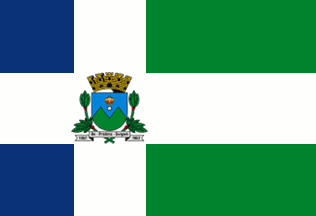 image by Dirk Schönberger,
21 September 2012
image by Dirk Schönberger,
21 September 2012Source: http://pt.wikipedia.org/wiki/Areias_(S%E3o_Paulo)

Last modified: 2013-01-01 by ian macdonald
Keywords: sao paulo | areias |
Links: FOTW homepage |
search |
disclaimer and copyright |
write us |
mirrors
 image by Dirk Schönberger,
21 September 2012
image by Dirk Schönberger,
21 September 2012
Source:
http://pt.wikipedia.org/wiki/Areias_(S%E3o_Paulo)
An off-centred white cross on blue-green-green-blue, with the municipal arms on the cross.
Official website at
http://www.areias.sp.gov.br
Dirk Schönberger, 21 September 2012
Areias was established in 1748 on the road form São Paulo and Minas
Gerais to Rio de Janeiro by Father Joaquim José da Silva and Captain
Gabriel Serafim da Silva, as the parish of Santana da Paraíba Nova.
The municipality of São Miguel das Areias was established on 28
November 1816 by King John VI, being the single municipality
established in São Paulo State by the king. He substituted the patron
saint of his son (St. Michael) to the original patron saint of the
place, St. Ann, which did not prevent the villagers to venerate St.
Ann. When granted the title of "cidade" on 24 March 1857, the
municipality was renamed Areias.
In 1838, Areias was the first place in Paraíba Valley where coffee was
grown. Incorporated to Rio de Janeiro State during the 1842
Revolution, Areias was transferred back to São Paulo State in 1843. On
17 August 1842, short before the proclamation of the independence of
Brazil, Regent Peter I stayed at the Solar Imperial Hotel, built in
1798 by Captain-General Gabriel Serafim da Silva.
http://www.areias.sp.gov.br/historia.htm - Municipal website
The flag of Areias was designed by the heraldist Vicente de Paulo Vale. The cross highlights the faith and Christian spirit of the people. White is a symbol of peace, friendship, purity, benignity, candour and religious feeling. "Deep blue" is a symbol of justice, fidelity, constancy, liberality, and incorruptible firmness. Green is a symbol of honour, civility, courtesy, abundance, youth, hope and joy, like the greening fields representing the ever renewed hope and joy of the people. The green quarters primarily represent the native forests, the Bocaina Fields and the Serra da Mantiqueira and Serra do Mar mountains, from which emerged the municipality. They also represent the coffee plantations, now disappeared, but the main cause of the early boom of the municipality. The coat of arms represents the political and administrative emancipation and sovereignty, symbolizing the municipal government and the town as the seat of the municipality. The four quarters represent the municipal power spreading all over the municipal territory.
The dimensions of the flag are 14 units x 20 units. The width of the
cross is 5 units. The dimensions of the blue quarters are 4.5 units x
4.5 units. The dimensions of the green quarters are 4.5 units x 10
units. The height of the coat of arms is 4.5 units.
http://www.areias.sp.gov.br/bandeira1.htm - Municipal website
The coat of arms of Areias was designed by the heraldist Benedito Calixto de Jesus as "Azure in chief a Brazilian Imperial crown or over an eight-pointed star argent the base vert serrated of two. The shield surmounted by an eight-towered mural crown or. The shield supported by two branches of coffee proper. Below the shield a scroll argent inscribed with the motto 'DE PRISTINIS SURGAM' surrounded by '1857' and '1957' all sable".
The Iberic shield, used in Portugal at the time of the discovery of
Brazil, evokes the first colonizers and builders of the country.
The Imperial crown recalls that the municipality was established
during the Brazilian Empire and represents the serene Imperial town,
stressing that Areias was a "Princess", a main town that shined all
over the area.
The star on the blue field recalls the patron saint of the town, St.
Ann.
The cross surmounting the Imperial crown and the "M" formed by the two
green triangles are the emblems of Jesus Christ and Mary,
respectively. They are a tribute to the Apostleship of Prayer, to the
Sodality of Our Lady and to the Pious Union of Mary, which are the
vital forces of the town.
The two triangles represent the Serra da Mantiqueira, from which the
builders of the town came, and the Serra do Mar, once the source of
the wealth of the town.
The mural crown is a symbol of municipal emancipation. The open ports
are a symbol of hospitality.
The coffee branches represent the force of Areias, the estates and the
source of wealth at the time of the coffee boom.
The years "1857" and "1957" recall the grant of the status of "cidade"
to Areias and the centenary of the grant, respectively.
http://www.areias.sp.gov.br/brasao1.htm - Municipal website
Ivan Sache, 30 December 2012